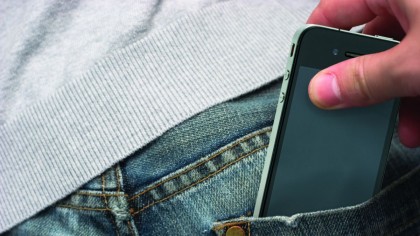Future smartphones could have anti-pickpocket technology
Keep your smartphone to yourself

If you've spent a huge sum of money on a phone, you don't want a cheeky thief to swipe it right out of your pocket, and phones in the future might have a handy feature that stops them doing just that – or, at least, makes it a lot harder for them to pick your pocket.
A patent filed by Swedish telecom company Ericsson (which you might know from the Sony Ericsson phones), shows new tech that phones could use to become much, much harder to steal – in theory.
- What we know about the new iPhone 11
- These are the best Sony phones
- What we want the Samsung Galaxy Note 10 to be
The technology would recognize who was holding a phone from their heartbeat – and if someone unauthorized was holding the phone, it would enter 'low-friction' mode.
In 'low-friction' mode the phone would vibrate quickly, making it a lot harder for potential thieves to pick up – in effect, it becomes too slippery to easily pick up. The tech also includes a 'hi-friction' mode, so when you're holding your phone, it's a lot less likely to slip out of your hands and fall to the ground.
In theory, 'low-friction' mode would help stop pesky pickpockets pinching your phone right out of your pocket, giving you that extra level of security when you're in a busy crowd – of course it won't help if your phone is stolen in any other way, but it still could be a useful feature.
Although the patent was only recently discovered, it was filed in February, so phone makers have had a few months to consider adding it to their handsets, however with the long production cycles of phones, even if handsets do end up using the tech it might be a few months before we see phones with this anti-robber technology.
Get daily insight, inspiration and deals in your inbox
Sign up for breaking news, reviews, opinion, top tech deals, and more.

Tom Bedford joined TechRadar in early 2019 as a staff writer, and left the team as deputy phones editor in late 2022 to work for entertainment site (and TR sister-site) What To Watch. He continues to contribute on a freelance basis for several sections including phones, audio and fitness.